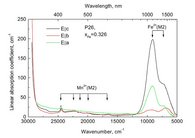Fe2+ and Fe3+ are the most abundant transition metal ions (3dN-ions) in minerals constituting the Earth’s mantle. Both Fe2+ (d6-) and Fe3+ (d5-electronic configuration) may undergo transitions from the high-spin (HS) to low spin (LS) state at pressures and temperatures expected in the Earth’s mantle. Such pressure-induced spin transitions have been predicted in 1960 by W. S. Fyfe. This phenomenon would lead to marked changes in geophysically important properties, such as elasticity and conductivity, and also to a different geochemical behavior, such as element partitioning. Therefore, this transition may have major influence on the Earth’s structure and dynamic.
The HS-LS transition of iron on the electronic energy levels of Fe2+ and Fe3+ can best be seen in optical absorption spectra but the properties are controversially discussed. To get a clear picture of how the optical spectra of oxygen-based minerals transform during the spin transition we collect spectra as a function of pressure from a material with a simple and intense spectrum of the electronic transition of Fe2+ to trace the HS-LS transition by optical spectroscopy and get better insight in these fundamental processes. The material of our choice are minerals of the triphylite-lithiophilite series.
Fig.: Polarized optical absorption spectra of a triphylite-lithiophilite solid solution at ambient condition with Fe2+ in the HS state. With increasing pressure the optical bands shift to higher wavenumbers. At pressures > 70 GPa we observed the transition of the Fe2+ to the LS state and collected completely different absorption behaviour.
Contacts
Prof. Dr. Monika Koch-Müller
Dr. Ilias Efthimiopoulos
Dr. Maribel Núñez-Valdez
Partners
Dr. Alexandra Friedrich, Institut für Anorganische Chemie, Universität Würzburg
Dr. Hanns-Peter Liermann, Deutsches Elektronen-Synchrotron Hamburg
Dr. Ulrich Schade, Helmholtz Zentrum Berlin, Institut Methoden der Materialentwicklung
Prof. Michail Taran, Institute of Geochemistry, Mineralogy and Ore Formation, Kyiv
Prof. Dr. Max Wilke, Universität Potsdam
Funding
DFG, GFZ


